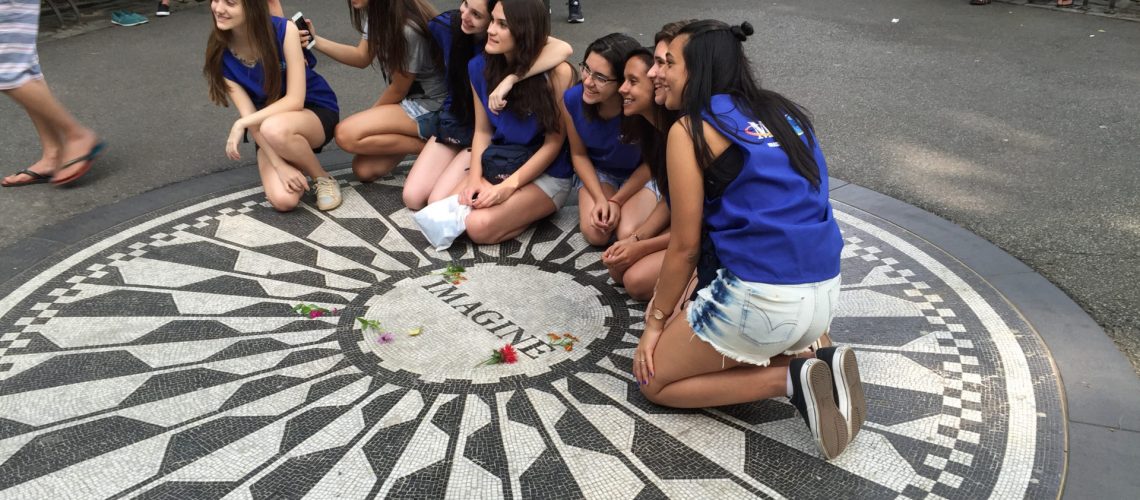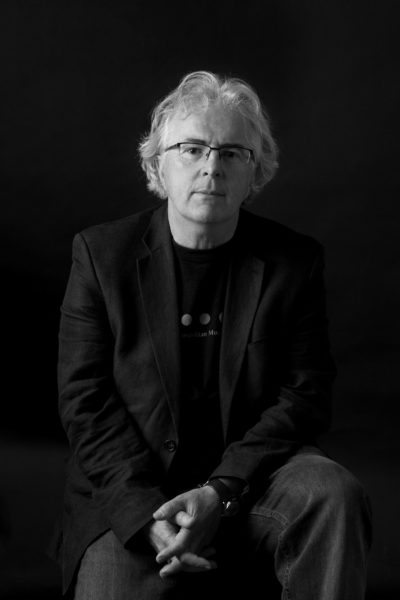Imagine there’s no countries
It isn’t hard to do
Nothing to kill or die for
And no religion, too
Everybody remembers where they were on 9/11.
I was in Manhattan, with Ciara. We were staying in Brian and Julie’s apartment on the Upper West Side. It was a stop-off on our way to Canada – a couple of weeks’ holiday in Vancouver and British Columbia.
It was morning, around nine. I was having a cup of tea and reading. Ciara was having a lie-in, she was still a bit jet-lagged.
The phone rang and I answered. It was Dusty O’Callaghan calling from Mallow, enquiring if Brian was okay, if he was down near the Twin Towers.
‘Brian is fine, he’s working over in Columbia,’ I said. ‘Why? What’s happened?’
Dusty told me.
I put the phone down and woke Ciara.
‘Something’s happened,’ I said. ‘You have to get up.’
The phone rang again. This time it was Ilona, Julie’s cousin. She was upset. She was worried about Brian, too. And Devi, Julie’s sister, who lived downtown. I reassured her about Brian.
Then Julie rang and told us to come over to Evie’s apartment, just across the road on Claremont Avenue. Julie and Brian were staying with Evie while we were in New York. So we went over and watched the horror unfold on Evie’s TV. By then both towers had been hit and it was clear that this was no accident.
I think I phoned home to let people everybody was okay. We heard afterwards that the Coghlans, Ciara’s family, were having a birthday party for Danny when they got news of the attacks and they were worried about us before word filtered to Waterford that we were safe.
As the din of sirens grew outside on the streets of Manhattan, Julie told us about growing up in New York watching the Twin Towers being built. Just before 10am the South Tower collapsed, to our gasps. Almost thirty minutes later the North Tower came down. News of the Pentagon and the Pennsylvania crashes came through.
By now America was in lockdown. The subways were closed, the bridges around Manhattan were closed. The phone lines were dead. Every commercial aircraft in the U.S. had been grounded. We could hear fighter jets patrolling the skies above us.
Sometime later we went out. Shock on people’s faces in the street. Siren after siren as fire trucks and ambulances blazed down Broadway and the Henry Hudson Parkway towards Ground Zero. We lit candles in a church off Amsterdam and made our way to Riverside Park.
From there we could see the smoke rising in the south.
On Riverside Park we saw our first spectre of a person covered in dust, walking on the path by the Hudson. People were trying to offer assistance but he just kept walking north, away from the smoke. Whether or not he was trying to get to Jersey, or the Bronx, or just away from the horror, I’ll never know.
A couple of days later we went down to Midtown. Down there the smell was bad. You could see the dust in the air, making everything a shade of grey. The smell was acrid, metallic. It was a wrong smell.
Of everything about 9/11, it’s the smell I remember most, the tiny particulates that had been the Twin Towers, now hanging in the air, being inhaled by people. Years later, we learned that those particulates were toxic and many people died from them. More than 40,000 people have become ill and have received government compensation from that dust.
U.S. flags were sprouting up everywhere. Flags on brownstones, flags on shop windows, flags on fire trucks and pickups. There were a lot of pickups.
On Lexington we noticed a trickle, then a torrent of people flowing out the front door of the Chrysler Building. There had been a bomb alert. People milled round on the pavement until a police officer directed them away. It reminded me when I was at a Jazz Festival event in the 1980s at the Jury’s Hotel in Cork, when there was a bomb scare and we all had to leave the building. We all gathered just outside the windows of the hotel, chatting, until somebody from Northern Ireland told us to get away from them. If there was a bomb, the glass would cut us to ribbons.
The shock was turning to anger in New York. At a Greek restaurant a man spoke loudly of ‘nuking the towelheads back to the dark ages’. Later that night we went downtown to pay our respects. Eventually we met the fences keeping people back from the wreckage. They were littered with heartbreaking hand-made notices. ‘My father is missing, please help me.’ ‘My mother is missing, please phone this number.’ ‘My daughter is missing, this is her picture.’ ‘My Dad is a firefighter and we don’t know where he is.’ Please help me, please help me, please help me.
Young people had taken over Washington Square. There were candles everywhere, and peace signs, and boys and girls handing out flowers. They were singing and crying and holding each other. They were singing Imagine and the Boxer and they were singing:
All we are saying is give peace a chance
All we are saying is give peace a chance
All we are saying is give peace a chance
All we are saying is give peace a chance
When I heard that and when I saw the young people talking and singing songs of love and peace, I knew that New York would be okay. New York is a young person’s city. They don’t have the power, or the money or the weapons but they are the life-blood that keeps the city alive. They keep New York being what it is.
A few days later, we rented a car and drove up to New England for a week. There were no flights. It would be another decade before we made it to Canada. We couldn’t go home, either. Eventually, maybe ten days after 9/11, flights did resume and we made it home and spent some time in Dingle with Padraig before returning to work.
I remember driving out of the car rental garage over near Central Park and negotiating our way up Broadway and out of the city and over George Washington Bridge and on to the freeway. I remember being stopped at a lights in Jersey and we held hands, seeing New York in our rear view mirror, shining across the Hudson.
Every time we return to New York we make our way to Ground Zero and pay homage to the selfless women and men who came to people’s rescue that day. And we grieve for all those who were working in or visiting the towers. We grieve, too, for all those innocents who lost their lives in the retaliations of the U.S. government. And the next time we’re there we’ll grieve for all the Afghan women who are in the grip of fundamentalists again, today, thanks to U.S governments.
And walking away from the memorials, maybe down to Battery Park or across to the Brooklyn Bridge or up to the Village, we’ll give thanks for New York City, the greatest city in the world, and for all those people who give peace a chance.

